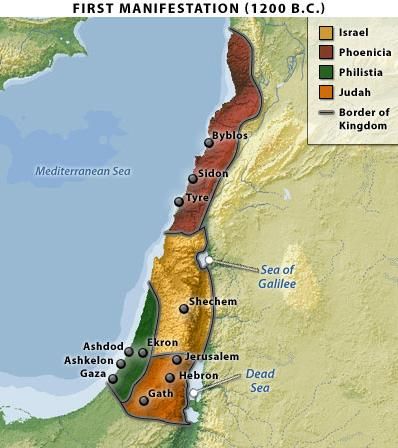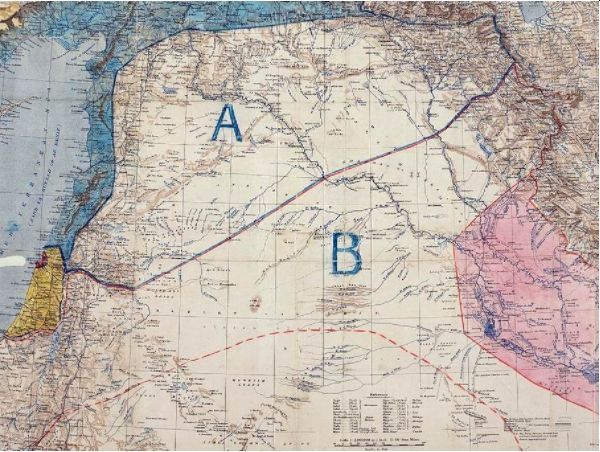By Eric Vandenbroeck and co-workers

Israelis and Arabs
have been fighting over Gaza on and off, for decades. It's part of the wider
Arab-Israeli conflict.
After World War II
and the Holocaust in which six million Jewish people were killed, more Jewish
people wanted their own country.
They were given a
large part of Palestine, which they considered their traditional home but the
Arabs who already lived there and in neighboring countries felt that was unfair
and didn't accept the new country.
In 1948, the two
sides went to war. When it ended, Gaza was controlled by Egypt and another
area, the West Bank, by Jordan. They contained thousands of Palestinians who
fled what was now the new Jewish home, Israel.
To know the context
of what follows start
with the overview here, and for reference list of personalities involved.
The Land that is Israel
Figuratively speaking one could say
that 'Israel' has manifested itself three times in history. The first
manifestation began with the invasion led by Joshua and lasted through its
division into two kingdoms, the Babylonian conquest of the Kingdom of Judah and
the deportation to Babylon early in the sixth century B.C. The second
manifestation began when Israel was recreated in 540 B.C. by the Persians, who
had defeated the Babylonians. The nature of this second manifestation changed
in the fourth century B.C., when Greece overran the Persian Empire and Israel,
and again in the first century B.C., when the Romans conquered the region.

To understand the complexity of Israel's founding, we
must first delve into the region's rich and layered history before the 20th
century. The ancient kingdom of Israel, founded around the 11th century BCE,
became the first organized Jewish state, while its southern neighbor, the
Kingdom of Judah, would later become the nucleus of Jewish religious and
cultural identity These kingdoms fell to successive empires—the Assyrians,
Babylonians, Persians, and finally the Romans. Jewish rebellion against Roman
rule culminated in the destruction of the Second Temple in 70 CE and the mass
dispersion of Jews throughout the Roman Empire, a key event known as the Jewish
Diaspora.
During the long
centuries of the Diaspora, Jews maintained a deep connection to the land of
Israel, even as the region passed under the control of various empires,
including the Byzantine, Islamic Caliphates, Crusaders, Mamluks, and the
Ottoman Empire. Despite periods of persecution and exile, small Jewish
communities continued to exist in cities such as Jerusalem, Hebron, Safed, and
Tiberias. Yet, the majority of Jews lived in Europe, North Africa, and the
Middle East, maintaining their religious and cultural traditions while yearning
for a return to their ancestral homeland—a central theme of Jewish prayer and
identity.
By the late 19th
century, the collapse of the Ottoman Empire, which had ruled the region for
centuries, signaled a new era of political upheaval and opportunity. The
region's strategic location, situated at the crossroads of Africa, Europe, and
Asia, meant that it attracted the interest of European powers, particularly
Britain and France, which sought to expand their colonial empires. The Sykes-Picot Agreement of 1916, negotiated in secret
between Britain and France, would later divide the Ottoman territories into
spheres of influence, including Palestine, where Britain assumed control
after World War I.
This period also
witnessed the rise of Arab nationalism, as the Arab population of the region,
inspired by the weakening of the Ottoman Empire and European colonialism, began
to assert its political aspirations. The desire for self-determination, led by Sharif Hussein coupled with resentment
towards European colonial powers, would create the foundation for
Arab resistance to the establishment of a Jewish state in Palestine.
The 19th century,
moreover, saw the beginning of a new chapter in Jewish history with the
emergence of modern nationalism, particularly Zionism, as Jews in Europe faced
increasing discrimination, persecution, and the challenges of assimilation.
This rising Jewish nationalist movement would ultimately shape the trajectory
of Jewish immigration to Palestine and lay the groundwork for the creation
of the State of Israel.
The Rise of Zionism
Zionism, the movement
for the establishment of a Jewish homeland in Palestine, arose in the late 19th
century in response to the twin pressures of European anti-Semitism and the
rise of nationalist movements across Europe. The term "Zionism" was coined by
Theodor Herzl, an Austrian-Jewish journalist and writer, in the late 19the
century, though the roots of Jewish yearning for a return to Zion (another
name for Jerusalem and the land of Israel) date back to ancient times.
Theodor Herzl, who
witnessed firsthand the virulent anti-Semitism of European society—most
notably during the Dreyfus Affair in France
—became convinced that the only solution to the "Jewish Question" was
for Jews to have their own nation-state. His landmark book, Der Judenstaat (The Jewish State), published in 1896, laid out
the ideological foundation of political Zionism. Herzl argued that Jews,
like other national groups in Europe, deserved the right to self-determination
and that this could only be achieved through the establishment of a sovereign
Jewish state in Palestine.
Zionism was not a
monolithic movement, however, and various factions emerged with differing
visions of what the future Jewish state should look like. Some early Zionists,
like Ahad Ha'am, promoted a cultural Zionism that
emphasized the revival of Hebrew and Jewish culture as Che basis for a
Jewish homeland, rather than the establishment of a political state.
Others, like Labor Zionists led by figures such as David Ben-Gurion, sought to
combine Zionist ideals with socialist principles, advocating for collective
agriculture (kibbutzim) and the building of a new Jewish society based on
equality and labor.
In the early years of
the Zionist movement, Jewish migration to Palestine was limited, but it gained
momentum with the waves of pogroms and anti-Semitic violence in
Eastern Europe, particularly in Russia, during the late 19th and early
20th centuries. This period saw the arrival of the First
Aliyah (Jewish immigration wave) in the 1880s, during which thousands of
Jews, many from Eastern Europe, settled in Palestine. These early settlers
faced significant hardships, including disease, economic instability, and
resistance from the local Arab population, but they laid the groundwork for
future Jewish immigration and state-building efforts.
For the early
Zionists, democratic values were embedded in a number of prior questions, many
of them complex and charged with emotion. Zionists
asked themselves if they should choose Palestine or some other country, if
they should start collective farms or promote private enterprise. Another
question was even more fundamental: Should immigration be organized en masse, by a sovereign Zionist
"corporation," though any such method of settling the Jewish national
home was bound to produce a mix of European languages there? Or should priority
be given to supporting small groups of cultural pioneers who were devoted to
evolving modern Hebrew, however gradually? Should Zionism wait for support from
the imperial powers or go it alone in small vanguard groups?
The early 20th
century witnessed further waves of Jewish immigration (the Second and Third
Aliyot), as Zionist pioneers established agricultural communities and cities
like Tel Aviv, seeking to fulfill the Zionist dream of building a Jewish
homeland. The Zionist movement also began to garner support from sympathetic
elements within European society, including some Christian Zionists who saw the
return of Jews to Palestine as part of a religious prophecy.
At the same time, Arab resistance to Jewish immigration and land
acquisition began to grow. The Arab population, which had lived in Palestine
for centuries under Ottoman rule, increasingly viewed Zionism as a threat to
their land, livelihoods, and national aspirations. Tensions between Jewish and
Arab communities escalated in the early decades of the 20th century, setting
the stage for future conflict as both groups sought to assert their claims to
the land.
European colonialism
played a pivotal role in shaping the modern
history of the Middle East, particularly in the decades leading up to the
founding of Israel. By the late 19th century, European powers had carved up
much of the world into colonial possessions, and the Middle East was no
exception. Britain and France, in particular, were major players in the region,
driven by their desire to control trade routes, access natural resources, and
extend their
The decline of the
Ottoman Empire, long referred to as the "sick man of Europe/ created an
opening for European intervention in the Middle East. During World War I, the
British and French made secret agreements (such as the Sykes-Picot Agreement)
to divide the Ottoman territories into spheres of influence. Following the
defeat of the Ottomans, the League of Nations granted Britain the
mandate to govern Palestine, a development that would have lasting
consequences for the region.
The resolution on Syria adopted
by the Eastern Committee one week later nevertheless completely disregarded
Cecil’s (and Hirtzel’s) warning. It contained a maximalist program, which
envisaged British predominance in Syria, and expected the French to give up
their rights under the Sykes–Picot agreement in area ‘A’, and even the Syrian
parts of the blue zone, in order that an ‘autonomous Arab State, with capital
at Damascus’ would have access to the sea. In exchange, Britain was
magnanimously prepared to ‘support the French claims to a special position in
the Lebanon and Beirut […] and at Alexandretta’, keeping in mind that it was
‘essential that no foreign influence other than that of Great Britain should be
predominant in areas A and B’.

The British Mandate in Palestine, which lasted from 1920
to 1948, was marked by a delicate balancing act as Britain tried to manage the
competing aspirations of Jews and Arabs in the territory. Britain had, through
the Balfour Declaration of 1917, expressed support for the establishment of a
"national home for the Jewish people" in Palestine. This declaration,
while vague in its terms, was seen by the Zionist movement as a
significant step toward realizing their goal of Jewish statehood.
However, Britain's
commitment to Zionism was tempered by its need to maintain stability in the
region, particularly as Arab resistance to Jewish immigration grew more
intense. Arab revolts in the 1920s and 1930s, fueled by opposition to Jewish
land purchases and fears of displacement, led Britain to issue a series of
White Papers that attempted to limit Jewish immigration and land acquisition.
These policies, in
turn, angered the Zionist movement, which viewed them as a betrayal of
Britain's earlier commitments.
The outbreak of World
War II and the Holocaust had a profound impact on the trajectory of Zionism and
the future of Palestine. The mass murder of six million Jews during the
Holocaust galvanized support for the establishment of a Jewish state, both
within the Jewish community and among sympathetic Western powers, particularly
the United States. The war also marked the decline of European
colonialism, as Britain and France, weakened by the conflict, began to retreat
from their colonial possessions.
In the post-war
period, international sympathy for the Jewish people, combined with the
strategic interests of the Western powers, paved the way for the United Nations
to propose a partition plan for Palestine in 1947. This plan, which called for
the creation of separate Jewish and Arab states, was accepted by the Zionist
leadership but rejected by the Arab states and Palestinian Arab leaders. The
subsequent war in 1948, which followed the declaration of the State of Israel,
resulted in the establishment of Israel and the displacement of hundreds of
thousands of Palestinian Arabs—a conflict that continues to resonate in the
region to this day,
European colonialism,
therefore, played a critical role in shaping the modern Middle East and the
conditions that led to the founding of Israel. The legacy of colonialism, with
its arbitrary borders, foreign intervention, and the imposition of external political
models, has left a lasting imprint on the region, contributing to the ongoing
conflicts and struggles for national identity and sovereignty.
For updates click hompage here